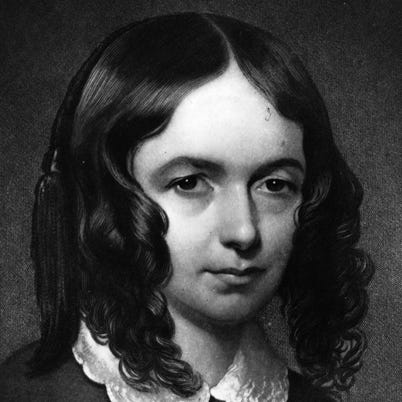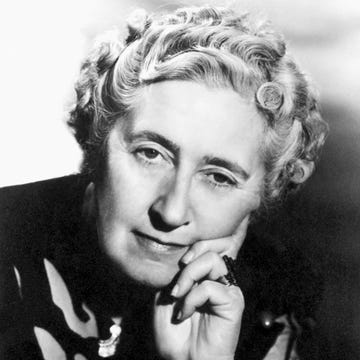(1806-1861)
Synopsis
Born in 1806, Victorian poet Elizabeth Barrett Browning published her first major collection, The Seraphim and Other Poems, in 1838. Her collection Poems (1844) caught the attention of fellow poet Robert Browning, whose admiring letter to her led to a lifelong romance and marriage. The couple moved to Italy, where Elizabeth became interested in Italian politics and released her monumental work, Sonnets From the Portuguese in 1850.
Early Life
Elizabeth Barrett Browning was born on March 6, 1806, at Coxhoe Hall, Durham, England. She was the oldest of 12 children, and her family made their fortune from Jamaican sugar plantations. Educated at home, Barrett was a precocious reader and writer. Having delved into classics such as the works of John Milton and William Shakespeare before her teen years, she also wrote her first book of poetry by age 12. Deeply religious, Barrett’s writing often explored Christian themes, a trait that would remain throughout her life’s works.
Emerging Writer
At age 14, Barrett developed a lung illness that required her to take morphine for the rest of her life, and the following year, she suffered a spinal injury that would serve as another setback. Despite her health issues, Barrett lived the literary life to the fullest, teaching herself Hebrew, studying Greek culture and publishing her first book in 1820, The Battle of Marathon, which her father bound and released privately.
In 1826, she (anonymously) published the collection An Essay on Mind and Other Poems, which became a touchstone in her writing career. Unfortunately, fate would throw more obstacles her way soon after its release. Barrett’s mother died two years later and her father’s business foundered, forcing him to sell their estate. The family eventually settled in London, but the interruption never gave Barrett pause. Soon after the estate was sold, she published her translation of Aeschylus’s Prometheus Bound (1833), and in 1838, she published The Seraphim and Other Poems.
Barrett’s poor health forced her to live with her brother Edward near the Sea of Torquay for a period, but tragedy would strike again when he drowned, and she returned to London, emotionally and physically shattered. Whether it was despite or because of her continued struggles, Barrett continued writing, and in 1844 her collection titled Poems was published. Besides catching the eye of the reading public, it also drew the attention of established English poet Robert Browning. Browning wrote Barrett a letter, and the pair exchanged nearly 600 letters over the following 20 months, which culminated in their elopement in 1846. Barrett’s father was very much against the marriage, and he never spoke with his daughter again.
Established Poet
In 1849, the Brownings' only child, Robert Wiedeman Barrett Browning, was born in Florence, Italy, the couple’s newly adopted country. A year later, Barrett Browning released Sonnets From the Portuguese, a collection of 44 love sonnets that would become one of her seminal works and one of the greatest sequences of sonnets in history. The collection was dedicated to Browning and written in secret during their courtship. "Sonnet 43" begins with “How do I love thee? Let me count the ways,” a line that itself would have sealed Barrett Browning’s place in the literary canon if all else had somehow failed to do so.
"How do I love thee? Let me count the ways. / I love thee to the depth and breadth and height / My soul can reach, when feeling out of sight / For the ends of being and ideal grace. / I love thee to the level of every day’s / Most quiet need, by sun and candle-light." -- Elizabeth Barrett Browning / How Do I Love Thee? (Sonnet 43)
Life in Florence was good to the poet’s creative process, as was the roiling political and social atmosphere in Italy. She published the politically charged poem "Casa Guidi Windows" in 1851. Barrett Browning followed it up in 1856 with Aurora Leigh (a blank-verse novel/poem), which is her longest work, and then Poems Before Congress in 1860. Included in the Poems Before Congress collection is “A Curse for a Nation,” which criticized slavery in America (although she doesn't specifically mention the country's name). The Boston abolitionist publication, The Independent, first published the poem in 1856.
She could never overcome her generally weak constitution though, and Barrett Browning died in Florence on June 29, 1861 at the age of 55 as one of the most beloved poets of the Romantic Movement.
QUICK FACTS
- Name: Elizabeth Barrett Browning
- Birth Year: 1806
- Birth date: March 6, 1806
- Birth City: Durham
- Birth Country: England
- Gender: Female
- Best Known For: Victorian poet Elizabeth Barrett Browning is perhaps best known for her 'Sonnets From the Portuguese' and 'Aurora Leigh' as well as the love story between her and fellow poet Robert Browning.
- Industries
- Fiction and Poetry
- Astrological Sign: Pisces
- Interesting Facts
- Elizabeth Barrett Browning and poet Robert Browning exchanged nearly 600 letters before eloping.
- Occupations
- Poet
- Death Year: 1861
- Death date: June 29, 1861
- Death City: Florence
- Death Country: Italy
Fact Check
We strive for accuracy and fairness.If you see something that doesn't look right,contact us!
CITATION INFORMATION
- Article Title: Elizabeth Barrett Browning Biography
- Author: Biography.com Editors
- Website Name: The Biography.com website
- Url: https://www.biography.com/authors-writers/elizabeth-barrett-browning
- Access Date:
- Publisher: A&E; Television Networks
- Last Updated: June 27, 2019
- Original Published Date: April 2, 2014












